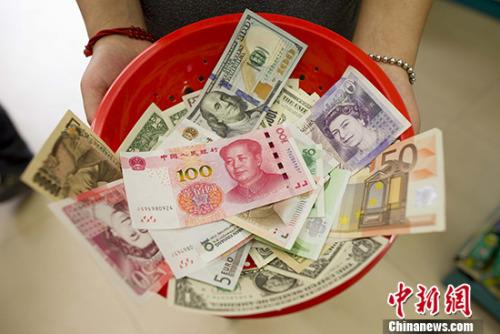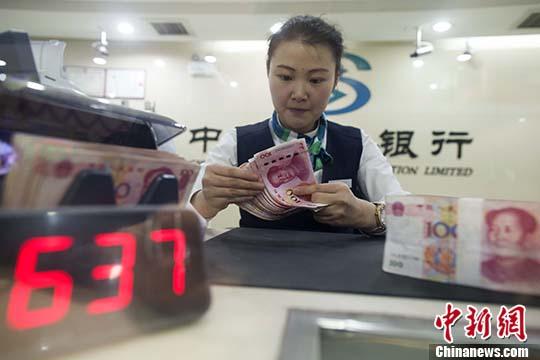Authority on Renminbi exchange rate fluctuations: without a continued decline in Foundation
CNS, Beijing, October 28 (reporters and)-according to the data released by the China foreign exchange Trade Center 27th, Yuan parity rate of 6.7736 Yuan against the dollar, following after a temporary increase the day before, again dropped 31 basis points lower over the years.
For the Yuan/dollar exchange rate volatility increases, many authorities one voice, and that, the main reason that caused this fluctuation, is fed rate hike expectations, promote a stronger dollar, but the Yuan against a basket of currencies stable, future devaluation of the RMB exchange rate does not exist ... With accelerated the process of internationalization of RMB, RMB foreign exchange market in the future will be more market-oriented.
Why the Yuan against the dollar weakens?
--The Federal Reserve's rate hike expectations have increased is the main reason
Since October, the Yuan/dollar exchange rate continues to go down.
"The Yuan weakened against the dollar in the near future, mainly thanks to the Fed's rate hike expectations push the dollar stronger. "The State administration of foreign exchange said Wang Chunying said at a news conference in the 21st.
According to Wang Chunying introduced, as of October 20, the dollar index climbed in the month 3%, under the influence of the world's main developed and emerging-market currencies fell, more than 100 currencies have different degrees of depreciation against the dollar. Euro, the devaluation of the British pound and the Japanese yen against the US dollar today, respectively 2.8%, 5.6%, and 2.5%; the same period, the Yuan exchange rate against the dollar today and the domestic and foreign market exchange rate decreased by 0.8%, 1% and 1.1%.
In view of this, the "RMB exchange rate decreases on a global scale is not big," said Wang Chunying,
Although Yuan bilateral currency depreciated against the dollar, but against a basket of the multilateral exchange rate appreciation. Big fluctuations, and contrast. Deputy Governor of the people's Bank of China Yi Gang recently wrote, "from the perspective of a longer time period, Yuan further enhanced bilateral exchange rate flexibility against the dollar, the Yuan against a basket of currencies to maintain the basic stability of volatility is less than the vast majority of reserve currencies, is far less than the money in emerging market economies. ”

Information diagram.
RMB exchange rate in the future please?
--There is no continued decline in Foundation
Yi stressed that China's economic growth remained at 6.5% to 7% economic growth is among the strongest in the world. Therefore, the RMB exchange rate will continue to remain basically stable at a reasonable and balanced level, there is no basis for depreciation.
On October 1 this year, Yuan became the SDR (special drawing right) one of the basket of currencies. Yi Gang, with respect, "the SDR is important for the stability of international monetary and financial system, and its use is gradually expanding. ”
The other hand, joined the SDR basket of currencies is also an important step in the process of the internationalization of RMB, along with synchronous speed up the marketization process of RMB, fluctuations in exchange rates or in a certain range will be the norm.
"The Yuan exchange rate fluctuations against the dollar's increase is a trend change, the Yuan is already the second-largest economy, we can accept more market-oriented exchange rate. "Researcher at the finance Research Institute of the development research center of the State Council Wu Qing, China said, currency markets are an important part of China's market-oriented reforms. We need to accept the reality of the future, is the exchange rate of the Yuan against the dollar may also occur such movements, on the one hand to accept a more market-oriented exchange rates on the other, because the dollar itself was not very stable.
Wu Qing, said in terms of exchange rates, future foreign exchange market will be more market-oriented, market supply and demand will decide to play a greater role in the exchange rate, don't worry too much, the impact of this change is limited, but the benefits are great.
 Information: on May 6, Taiyuan, Shanxi, Bank staff are counting the money. New Zhang Xinhua photo
Information: on May 6, Taiyuan, Shanxi, Bank staff are counting the money. New Zhang Xinhua photo Geometry effect on the capital flows?
--Cross-border capital outflow pressure overall remission
RMB exchange rate fluctuations, often triggered speculation in markets for cross-border capital flows. Figures from China's Central Bank, 2016 the first three quarters, China's cross-border capital flow pressure overall remission.
According to c. r. Wang introduced, FX data from the Bank, 2016 deficit of 124.8 billion US dollars in the first quarter, two or three quarter deficits narrowed significantly in the first quarter, was $ 49 billion in the second quarter, the third quarter was $ 69.6 billion. From the Bank's international payments data, 112.3 billion deficit in the first three quarters respectively, 56.5 billion and 85.5 billion US dollars, of which foreign exchange receipts and payments for the deficit of 36.6 billion US dollars in the first quarter, the second and third quarter to a surplus of 10.7 billion and $ 17.6 billion.
Currently, helped China maintain basic stability of cross-border capital flows did not change the fundamental factors, including China's economic growth is still at a high level all over the world fiscal situation relatively well, overall financial system robust, persistent current account surplus and foreign currency reserves remained adequate. "Wang Chunying said.
Mention of China's accession to the SDR's influence on cross-border flows, Wang Chunying is expected, "RMB after joining the SDR currency basket, scale and openness of China's cross-border flows will further increase, bi-directional flow, balance patterns will support new factor." Next, Exchange will continue to steadily promote capital account convertibility, improve cross-border flows of macro-prudential regulatory framework, strengthen statistical monitoring and analysis of cross-border flows of early warning, firmly hold the bottom line risk is a systemic culture and promote basic balance of international payments. (End)
(Editors: Biao Guo UN832)
2016-10-28 00:12:29
China News Network
权威人士谈人民币汇率波动:不存持续贬值基础
中新网北京10月28日电(种卿)根据中国外汇交易中心27日公布的数据,人民币对美元汇率中间价报6.7736元,继前一日短暂上调后,再度下跌31个基点,处多年来低位。
针对人民币对美元汇率波幅的加大,多位权威人士接连发声表示,造成此轮波动的主因,是美联储加息预期升温、推动美元走强,但人民币对一篮子货币汇率表现稳定,未来人民币汇率不存在持续贬值基础。伴随人民币国际化进程的加速推进,未来人民币的外汇市场会更加市场化。
人民币对美元缘何走弱?
——美联储加息预期增强是主因
10月以来,人民币对美元汇率持续走跌。
“近期人民币对美元汇率走弱,主要是由于美联储加息预期升温推动美元汇率走强。”国家外汇管理局新闻发言人王春英在21日的新闻发布会上说。
据王春英介绍,截至10月20日,美元指数当月累计上涨3%,受此影响全球主要发达和新兴市场货币普遍下跌,超过100种货币对美元有不同程度的贬值。欧元、英镑和日元对美元汇率累计分别贬值2.8%、5.6%和2.5%;同期,人民币对美元汇率中间价和境内外市场汇率累计分别下跌0.8%、1%和1.1%。
由此看来,“人民币汇率跌幅在全球范围内并不大”,王春英说,
虽然人民币对美元双边汇率有所贬值,但对一篮子多边汇率升值。 波动幅度大不大,还要对比来看。中国人民银行副行长易刚近日撰文表示,“从较长时间段看,人民币对美元双边汇率弹性进一步增强,人民币对一篮子货币汇率保持了基本稳定,波动率小于绝大多数储备货币,更是远小于新兴市场经济体货币。”

资料图。
人民币汇率未来怎么走?
——不存在持续贬值基础
易纲强调,中国经济增速保持在6.5%至7%,经济增速在世界范围内处于最强劲之列。因此,人民币汇率将继续在合理均衡的水平上保持基本稳定,不存在持续贬值的基础。
今年10月1日,人民币正式成为SDR(特别提款权)篮子货币之一。易刚直言,“SDR对于稳定国际货币金融体系具有重要意义,其使用正逐步扩大。”
另一方面,加入SDR一篮子货币也是人民币国际化进程的重要一步,伴随人民币市场化进程的同步加快,在一定范围内的汇率浮动或将成为常态。
“人民币对美元汇率波动幅度的加大是一种趋势性变化,人民币已经是第二大经济体,相应的我们可以接受更加市场化的汇率。”中国国务院发展研究中心金融研究所研究员吴庆表示,汇率市场是中国市场化改革的重要组成部分。未来我们需要接受一个现实,就是人民币对美元的汇率可能还会出现这种升降,一方面要接受一个更加市场化的汇率;另一方面,也因为美元自身不是非常稳定。
吴庆称,在汇率方面,未来人民币的外汇市场会更加市场化,市场的供求将在汇率的决定上起到更大的作用,不必过多的担心变化,这个变化带来的冲击是有限的,好处却是很大的。
 资料图:5月6日,山西太原,银行工作人员正在清点货币。 中新社记者 张云 摄
资料图:5月6日,山西太原,银行工作人员正在清点货币。 中新社记者 张云 摄 对资本流动影响几何?
——跨境资金流出压力总体有所缓解
人民币汇率波动,时常会引发市场对于跨境资金流向的猜想。而来自中国中央银行的数据显示,2016年前三季度,中国跨境资本流出压力总体呈缓解态势。
据王春荣介绍,从银行结售汇数据看,2016年一季度逆差1248亿美元,二、三季度逆差较一季度明显收窄,第二季度是490亿美元,第三季度是696亿美元。从银行代客涉外收付款数据看,前三个季度的逆差分别为1123亿、565亿和855亿美元,其中,涉外外汇收付款在一季度为逆差366亿美元,第二和第三季度转为顺差107亿和176亿美元。
当前,有助于中国跨境资本流动保持基本稳定的根本性因素没有改变,包括中国经济增速在全球范围内仍处于较高水平;财政状况相对良好、金融体系总体稳健、经常账户持续顺差、外汇储备依然充裕。”王春英称。
谈及人民币加入SDR对跨境资金流动的影响,王春英预计,“人民币加入SDR货币篮子后,中国跨境资金流动的规模和开放度将进一步提高,双向流动、基本平衡的格局将有新的支持因素”。下一步,外汇局将继续稳步推进资本项目可兑换,完善跨境资金流动的宏观审慎管理框架,加强对跨境资金流动的统计监测和分析预警,坚决守住不发生系统性区域性风险底线,促进国际收支基本平衡。(完)
(责任编辑:郭彪 UN832)
2016-10-28 00:12:29
中国新闻网